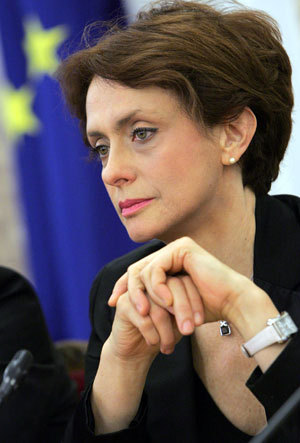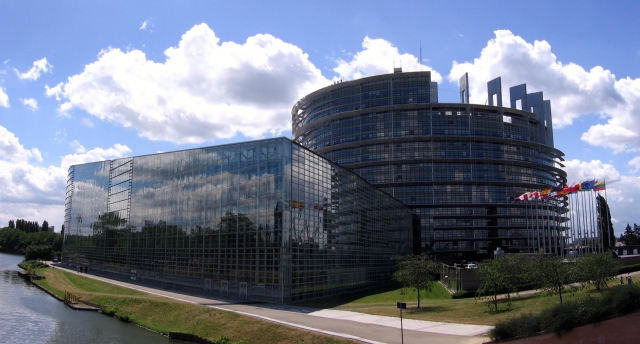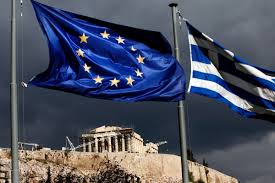Picture: ethnos.gr
Anastasia Balezdrova
Nadezhda Neynsky is the leader of the “Blue Unity” party and an MEP from the European People's Party. She was Minister of Foreign Affairs of Bulgaria in the period 1997 - 2001 and her name is associated with the fall of the visa regime for Bulgarian citizens. By profession, she is a translator of Spanish poetry and English literature. Between 1991 and 1993, she was a spokesperson and headed the press centre of the government of Philip Dimitrov.

GRReporter met Nadezhda Neynsky in Athens, where she attended the conference Athens Forum Go for Democracy. Anastasia Balezdrova talked to her.
Mrs Neynsky, do you think that centrifugal forces in Europe will outweigh centripetal forces after the next elections for members of the European Parliament?
This is difficult to predict, but I think that centripetal forces will be stronger, since these are the forces of common sense. The easiest thing for Europe is to disperse. But this is not a solution. And maybe even those who advocate this do not believe in its consistency. To the contrary, they are even convinced that this will not give the desired result.
We can make all kinds of emotional statements. For example, we can say that if something like this happens, it will mean that the dream of the founders of united Europe will be betrayed - the dream of Schuman, de Gasperi, and Adenauer, who managed to unite post-war Europe and motivate a common effort.
I think that disintegration begins where there is little motivation. And little motivation is usually an expression of the fact that leaders are not able to motivate people for the greatest effort. Ultimately, leadership is precisely this. If people who are elected to lead their countries lack the vision, strategy, and most importantly - the courage - to go all the way, they always seek refuge in the trenches of the easiest solutions. And nationalism begins where the easiest solutions lie. We are in Athens talking about division, which is perhaps the most dangerous word in the Balkans, since the history of the Balkans is a history of division. In all cases, the word "Balkans" is always associated with wars and divisions. Therefore, at the conference, I insisted that we must reinstate the self-confidence of the word "Balkans". This is a region which is more popular with divisions, but it is also a region from which civilization actually started. We have to try to turn what was once a flaw into a huge advantage, since in the new century, the new conditions of communication, open information spaces, open markets, free movement of people, and the fact that we are located in precisely such a place in Europe, which could actually become a really valuable source of prosperity for nations if there is strategic thinking. In this sense, I believe that common sense and motivation will prevail.
It is a fact that the European elections generally take place with a low voter turnout. Do you think that this will happen now as well, and more importantly, how could young people be motivated to vote?
Again - leadership, leadership, leadership. Young people cannot be motivated only by programmes, speeches and even by political events such as this conference (Athens Forum Go for Democracy, 6-7 February in Athens – author’s note). They can only be motivated when they see the meaning of efforts and the meaning of their participation in politics.
In fact, what Europe has recognized as a major problem in recent years is the divergence of political elites from people. And the gap which has occurred has allowed populists and nationalists to fill it. And this is very dangerous. Therefore young people, and not only them, can be motivated only when Europe finds the right language and when it manages to explain its policy and, most importantly, when it is able to show the public that it has learned from its mistakes.

Europe's double standards have been one of the biggest mistakes over the years. As a foreign minister, I used to always motivate my people to go all the way, making efforts and enduring hardship, and I always used to say that Europe means rules, law and order. But we all know that there are many cases of double standards and ignoring real dangers. However, the inability to address psychological problems, worries and fears among people has created the greatest “monsters” in European history. Therefore, I would like to express hope that during the campaign Europe will send a signal that it is aware of the path and has the courage to go all the way and its mistakes will teach it a lesson.
What is your attitude to proposals by Guy Ferhovstad, Massimo D'Alema and other politicians that citizens should vote directly for parties which are represented in the European Parliament, and that the president of the European Commission should be elected by the largest parliamentary group in order for citizens to be indirectly involved in this choice? Ferhovstad even proposed that we should pay taxes directly to Europe in order to strengthen the link between citizens and European institutions. What do you think of these suggestions?
It's hard to analyse each one of them. When you started listing them, I thought: the first "yes", the second - "no", etc. But the truth is that the devil is always in the details. My long political experience has shown that often there are good intentions, which, however, cannot be applied.
The truth is that you need to identify the connecting links. Prosperous Europe is going through several key political moments which will affect the mentality of the nations. For example, the topic of this conference was a possible North-South division. I am a citizen of a country which was the subject of another division - between the East and the West. Such divisions always exist. And in fact the strategy is to find ways to intercept people's fears. The idea for the President of the European Commission to be elected by the largest parliamentary group in the European Parliament is still a matter of some quotas. If we really want Europe to work as a single mechanism, we have to find those binding sites which will enable people, whether they are Germans, Greeks or Bulgarians, to feel the same way in the European Union. That is, not to divide people into nations, despite the fact that we will keep our national identity, but to divide them into successful and failed, capable and unable, committed and uncommitted. In this way we will enable motivated people to become the driving force of the EU. I realize that people are not equally smart, equally ambitious, and equally motivated in life. That is why there are people who are chosen to do what others are unable to. This does not make them people belonging to a higher class compared to those who do not have the relevant skills.

I think that, besides political, the debate in the European Union is also an economic and moral debate about values, a debate about tolerance and the ability to find common solutions. It is a debate which despite being at the heart of the creation of the European Union, has somehow stepped into the background in recent years, since everybody has been immersed in the economic and political crisis, in the expansion of the European Union, etc. And the need for values and morals has also somehow faded into the background. These words have now become clichés to some extent. But ultimately, it is the base from which everything starts. This is what actually makes you react in one way or another, regardless of whether you're a politician, financier, or an employee in the private or public sector. And when these invisible things are drawn closer – although they will never be aligned - then we will suddenly see that there are solutions for everything. In contrast, the creation of quotas, of larger and smaller groups, of first and second states in the EU, of Catholics and Orthodox – these are all divisions. I will say it again - I come from a country where communism was based on a number of divisions: people from cities and villagers, residents of the capital city and the country, and many others. But a divided nation and a divided European Union can become the object of secret aspirations by nationalists and populists. And the great dream for which several generations of Europeans have worked so far will end up in the mud.

Would you compare the crisis which Greece, Spain and Portugal are currently experiencing with the crisis in Bulgaria in 1990 and 1996? What are the similarities and what are the differences?
It will take us a long time in order to discuss the similarities and differences, but your question has provoked me to say something which may have affected me to some extent at the conference - the explicit portrayal of Bulgaria as a poorer country compared to Greece.
I am completely aware of the economic problems which my fellow-country people are facing since I know them very well both as a politician and citizen. But at the same time, if we do not bear in mind what Bulgaria has achieved in recent years in terms of macroeconomic stability – financial stability, the protected financial and banking system - it means that we do not respect ourselves. In this sense, I believe that with good governance, it is just a matter of time for Bulgaria to be able to stabilize and really raise the standard of living, because the base is solid.

It is no coincidence that I am saying that the Bulgarian government in the period between 1997 and 2001 laid such significant foundations in terms of reforms - with all the criticism against it. Undoubtedly, these reforms are extremely unpopular. Actually, this is a typical example and proves that leadership consists of taking unpopular decisions. Since if we had slipped and gone downhill to the love of people, as populists often say, we would probably never have implemented even one hundredth of what was achieved in terms of reforms, privatization, accession to the EU, removal of visas and joining NATO. And then, of course, we would have searched for the guilt elsewhere and not in us, as is customary in the Balkans. But the problem would have been ours alone.
What is happening in Greece shows this. The problems faced by the countries of the Western Balkans prove it. I.e., during these four years, a number of unpopular but basic decisions have been taken, thanks to which this policy evolved. Hereinafter, it may be more or less successful. It can experience ups and downs, but at least the road is permanently chosen. And this gives a sense of security even to the most biased to some extent. As it is popular to say: We, the countries from the European Union, will not leave it unless some exclusive upheaval happens or the EU itself falls apart.
Of course, from now on, the most important thing is which people will govern us. The popular Bulgarian proverb “help yourself and God will help you” is absolutely valid in this case. Of course, the EU is not God, it is far from that image, but in all cases it is the framework for us. Whether we will be able to use its tools properly for the benefit of our own citizens, whether this will be a motivation and a source of national pride depends only on us. Because I see that people in Bulgaria tend to blame politicians.
And probably politicians have countless sins. But politicians are the choice of the people. Currently, the popular topic of whether voting should be mandatory or optional is being discussed. I have been extremely allergic to mandatory things for a long time and I will say that not giving a choice, but at the same time making voting mandatory, is not morally good, and I think that it is not good even from a political and legal point of view either. Another thing is that the obvious reluctance to vote is the protest vote. And where will this protest vote go, if people are forced to vote? Also, imagine what a “monster” this will become, since people strongly support each other in protests just in order to show their reluctance to those who require them to vote for them. Therefore, this is a very dangerous thing. On the other hand, at first glance and from a populist perspective, everyone says that this will immediately make people support small right-wing parties, for example. I do not think that such a thing would happen. Of course, the question is disputable.
We need to find the things which motivate people in seeking solutions and their right to influence politics. If voters could solve the problems, they would be leaders. Obviously, they want to delegate their rights to leaders, but the important thing here is to which leaders and in what way to do this in order to ensure their interests in the best possible way. But as I often say, if this was easy, it would have been done long ago. But this is the way.
Why has the political right in Bulgaria failed to unite?
Many and varied answers can be given to that question, some of which pretend to be original. What often happens is that we look for reasons elsewhere, but not in us – for example, in the popular thesis of conspiracy and how someone splits us from the outside. The truth is that the fault is all ours - the inability to form priorities and the lack of team thinking. I will say it again - the most powerful years of the government in which I participated were when we really worked as a team, side by side, on the priorities of Bulgaria. At such times energy is very strong, catchy and involving. People really supported our government even during the years when we made unpopular decisions. But when the situation is really difficult, when there is a lack of perspectives, at such times individualism and a search for solutions appear, but also the Southern people typically claim that everyone is right.
At this point, with some diplomacy of course, I will avoid discussing the issue of dependencies, since obviously, during all these years of the political right, a lot of people looked for their own dependencies or were forced to find their own ways. I certainly do not know the whole truth about what happened. Maybe each one claims to know part of the truth. Surely, no one knows the whole truth of why we got here.
But I am convinced that the only way is to offer a serious alternative to the government in Bulgaria, which is obviously suffering from the greatest ills of transition, including dependencies and backstage power. Majority vote is now often mentioned. What is happening must be very indicative for voters, since no one knows who actually hides behind majority players. Or, for example, the big risk of buying votes. How much riskier would it be if people who have the means, the so-called oligarchs, bought their deputies or ministers or even prime ministers?
Therefore, everything needs to be a very complex and difficult balance so that public interests can be

protected. The problem with the new political right, which is represented by GERD, is not whether they are right or left, but whether they are democratic. Their governance has serious democratic deficits. And the worst is not only that they are unaware of this, but that they turn these into their own positives which actually take us back to decades ago. However, in order for people to have an alternative, they need to see enough integrity and transparency in it and it should be based on the best traditions of the political right. And regardless of the criticisms to which we were exposed, the government between 1997 and 2001 was like that. Not because I was part of it, but because the mere fact that Bulgaria started negotiations with the European Union and removed visas was the result of teamwork. I have said many times that this is not a matter of foreign policy, but a matter of domestic policy. No matter how successful the actions of foreign ministers are, they cannot do anything if they are not supported by a stable, predictable and serious domestic policy. This good experience should give us the confidence and courage to go ahead and develop it under the new conditions and with new people.
However, giving up your roots and looking for options to collect what is irrecoverable, as well as accumulating politicians, parties, emotions, traditions, etc. does not work in my opinion.
What are your personal plans from here on? Will you run for an MEP?
I probably will. I say this because at the moment "Blue Unity" is having talks (and I insist on the word “talks”, and not "negotiations") in search of support for the European Parliament’s list, which will basically be representative of our idea of a single right-wing party. This list will basically be the political message of what we think should happen with the political right.
"Blue unity" was created as a party not in order to participate in the latest political combinations and make survival coalitions with various other formations just in order to pass the barrier, but rather as a sign or a message to people that a new house should be built around the political right, along with the experience and good practices. The new house should be built on the pulled-down foundations of the old building and not like Bulgarians like it - first a small house, then an additional building, then another building, an additional glazed balcony and a “hat” on top of everything. In order for the house to be robust and withstand earthquakes, winds and storms, it has to be a real house.
In this sense, we hope to get support for such a list. If we receive it from NGOs, individuals and political parties, our idea is to gather them on this platform after the European elections, and if they agree, they will become co-founders of this new traditional political right. Then I will be ready to represent this message. But now talks are still ongoing, so it is still too early to say anything.
How do you see the political situation in Greece? Do you think that the government of Samaras will be able to stay until the end of its term?
More important is whether the government of Samaras will take the necessary and important steps in order to restore the confidence in Greece not only in its partners outside, but in people in institutions within the country itself. I think that this is the challenge for the government of Samaras.

As a bystander, if you ask me whether it is more important for him to finish his mandate or to do the right things, of course I would say both. But if I had to choose - in all cases these would be the right things. And this is what I can wish the Greek government: to be tough in terms of reforms. Experience has shown me that this costs a lot, but in this way the government will be remembered in history for something good, since sometimes people remain in history for bad things. I believe that they have a chance to show that Greece has the right to a new opportunity to bring it back to where it was as an authority and respected member of the European Union.